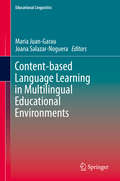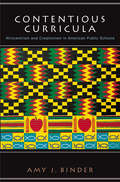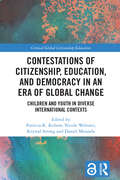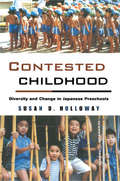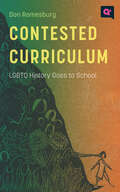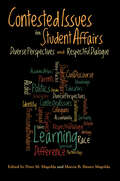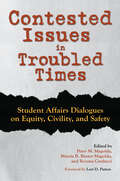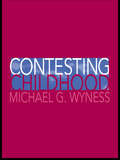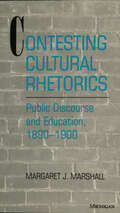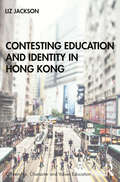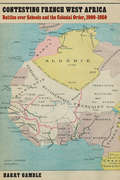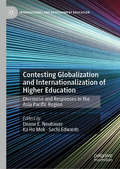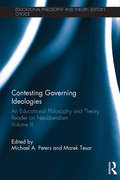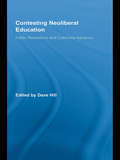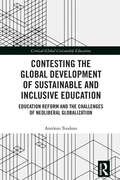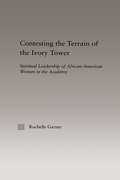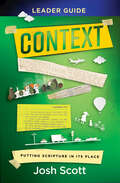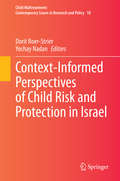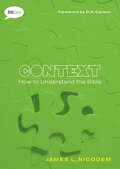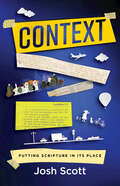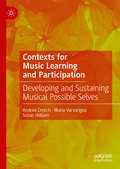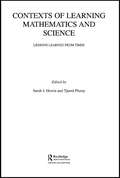- Table View
- List View
Content-based Language Learning in Multilingual Educational Environments (Educational Linguistics #23)
by Maria Juan-Garau Joana Salazar-NogueraThe spread of English as an international language along with the desire to maintain local languages lead us to consider multilingualism as the norm rather than the exception. Consequently, bi/multilingual education has bloomed over the last decades. This volume deals with one such type of education currently in the spotlight as an essentially European strategy to multilingualism, CLIL (Content and Language Integrated Learning), in which curricular content is taught through a foreign language. The book contributes new empirical evidence on its effects on linguistic and attitudinal outcomes focusing on bi/multilingual learners who acquire English as an additional language. Moreover, it presents critical analyses of factors influencing multilingual education, the effects of CLIL on both language and content learning, and the contrast between CLIL and other models of instruction. The research presented suggests that CLIL can greatly enhance language acquisition in multilingual settings.
Contentious Curricula: Afrocentrism and Creationism in American Public Schools (Princeton Studies in Cultural Sociology #35)
by Amy BinderThis book compares two challenges made to American public school curricula in the 1980s and 1990s. It identifies striking similarities between proponents of Afrocentrism and creationism, accounts for their differential outcomes, and draws important conclusions for the study of culture, organizations, and social movements. Amy Binder gives a brief history of both movements and then describes how their challenges played out in seven school districts. Despite their very different constituencies--inner-city African American cultural essentialists and predominately white suburban Christian conservatives--Afrocentrists and creationists had much in common. Both made similar arguments about oppression and their children's well-being, both faced skepticism from educators about their factual claims, and both mounted their challenges through bureaucratic channels. In each case, challenged school systems were ultimately able to minimize or reject challengers' demands, but the process varied by case and type of challenge. Binder finds that Afrocentrists were more successful in advancing their cause than were creationists because they appeared to offer a solution to the real problem of urban school failure, met with more administrative sympathy toward their complaints of historic exclusion, sought to alter lower-prestige curricula (history, not science), and faced opponents who lacked a legal remedy comparable to the rule of church-state separation invoked by creationism's opponents. Binder's analysis yields several lessons for social movements research, suggesting that researchers need to pay greater attention to how movements seek to influence bureaucratic decision making, often from within. It also demonstrates the benefits of examining discursive, structural, and institutional factors in concert.
Contestations of Citizenship, Education, and Democracy in an Era of Global Change: Children and Youth in Diverse International Contexts (Critical Global Citizenship Education)
by Daniel Miranda Patricia K. Kubow Nicole Webster Krystal StrongContestations of Citizenship, Education, and Democracy in an Era of Global Change: Children and Youth in Diverse International Contexts considers the shifting social, political, economic, and educational structures shaping contemporary experiences, understandings, and practices of citizenship among children and youth in diverse international contexts. As such, this edited volume examines the meaning of citizenship in an era defined by monumental global change. Chapters from across both the Global South and Global North consider emerging formations of citizenship and citizen identities among children and youth in formal and non-formal education contexts, as well as the social and civic imaginaries and practices to which children and youth engage, both in and outside of schools. Rich empirical contributions from an international team of contributors call attention to the social, political, economic, and educational structures shaping the ways young people view citizenship and highlight the social and political agency of children and youth amidst increasing issues of polarization, climate change, conflict, migration, extremism, and authoritarianism. The volume ultimately identifies emergent forms of citizenship developing in formal and non-formal educational contexts, including those that unsettle the nation-state and democracy. Edited by a team of academics with backgrounds in education, citizenship, and youth studies, this book will appeal to scholars, researchers, and faculty who work across the broader field of youth civic engagement and democracy, well as international and comparative education and citizenship.
Contested Childhood: Diversity and Change in Japanese Preschools
by Susan D. HollowayIn Contested Childhood, Holloway, an educational and developmental psychologist, examines the Japanese preschool and identifies the cultural models that guide Japanese child-rearing as being contentious and fragmented. She looks at the societal, religious and economic factors that shape various preschool programs and shows how culture influences child-rearing beliefs and practices.
Contested Curriculum: LGBTQ History Goes to School (Q+ Public)
by Don RomesburgToday, many states have proposed so-called “Don’t Say Gay” bills that prohibit public school teachers from mentioning LGBTQ topics in the classroom. But a few states, like California, have taken decisive steps in the other direction. They mandate inclusive education that treats LGBTQ history as essential to the curriculum. At once a history of an evolving movement and an activist handbook, Contested Curriculum navigates the rocky path to LGBTQ-inclusive K–12 history education in the United States and recounts the fight for a curriculum that recognizes the value of queer and trans lives. What began in fits and starts in activism and educational materials across the late twentieth century led to the passage of California’s landmark FAIR Education Act in 2011, ensuring that LGBTQ history has a place in the K–12 classroom. Historian Don Romesburg, the lead scholar who worked with advocacy organizations to pass the act, recounts the decades-long struggle to integrate LGBTQ content into history education policy, textbooks, and classrooms. Looking at California and states that followed its lead, he assesses the challenges and opportunities presented by this new way of teaching history. Romesburg’s powerful case for LGBTQ-inclusive education is all the more urgent in this era of anti-gay book bans, regressive legislation, and attempts to diminish the vital role that inclusive and honest history education should play in a democratic nation.
Contested Issues in Student Affairs: Diverse Perspectives and Respectful Dialogue
by MARCIA B. BAXTER MAGOLDA Peter M. MagoldaWhat is your level of understanding of the many moral, ideological, and political issues that student affairs educators regularly encounter? What is your personal responsibility to addressing these issues? What are the rationales behind your decisions? What are the theoretical perspectives you might choose and why? How do your responses compare with those of colleagues?Contested Issues in Student Affairs augments traditional introductory handbooks that focus on functional areas (e.g., residence life, career services) and organizational issues. It fills a void by addressing the social, educational and moral concepts and concerns of student affairs work that transcend content areas and administrative units, such as the tensions between theory and practice, academic affairs and student affairs, risk taking and failure; and such as issues of race, ethnicity, sexual orientation, and spirituality. It places learning and social justice at the epicenter of student affairs practice.The book addresses these issues by asking 24 critical and contentious questions that go to the heart of contemporary educational practice. Intended equally for future student affairs educators in graduate preparation programs, and as reading for professional development workshops, it is designed to stimulate reflection and prompt readers to clarify their own thinking and practice as they confront the complexities of higher education.Student affairs faculty, administrators, and graduate students here situate these 24 questions historically in the professional literature, present background information and context, define key terms, summarize the diverse ideological and theoretical responses to the questions, make explicit their own perspectives and responses, discuss their political implications, and set them in the context of the changing nature of student affairs work. Each chapter is followed by a response that offers additional perspectives and complications, reminding readers of the ambiguity and complexity of many situations.Each chapter concludes with a brief annotated bibliography of seminal works that offer additional information on the topic, as well as with a URL to a moderated blog site that encourages further conversation on each topic and allows readers to teach and learn from each other, and interact with colleagues beyond their immediate campus. The website invites readers to post blogs, respond to each other, and upload relevant resources. The book aims to serve as a conversation starter to engage professionals in on-going dialogue about these complex and enduring challenges.Short ContentsThe 24 questions are organized into four units.I. The Philosophical Foundations of Student Affairs in Higher Education explores the implications and complications of student affair educators placing learning at the epicenter of their professional work. II. The Challenges of Promoting Learning and Development explores the challenges associated with learning-centered practice. III. Achieving Inclusive and Equitable Learning Environments addresses crafting learning environments that include students whose needs are often labeled “special,” or students and/or student subcultures that are often marginalized and encouraged to adapt to normalizing expectations. IV. Organizing Student Affairs Practice for Learning and Social Justice addresses the organizational and professional implications of placing learning and social justice at the epicenter of student affairs practice.
Contested Issues in Troubled Times: Student Affairs Dialogues on Equity, Civility, and Safety
by Rozana Carducci Marcia B. Baxter Magolda Peter M. MagoldaContested Issues in Troubled Times provides student affairs educators with frameworks to constructively think about and navigate the contentious climate they are increasingly encountering on campus.The 54 contributors address the book’s overarching question: How do we create an equitable climate conducive to learning in a dynamic environment fraught with complexity and a socio-political context characterized by escalating intolerance, incivility, and overt discrimination?Rather than attempting to offer readers definitive solutions, this book illustrates the possibilities and promise of acknowledging multiple approaches to addressing contentious issues, articulating a persuasive argument anchored in professional judgment, listening attentively to others for points of connection as well as divergence, and drawing upon new ways of thinking to foster safe and inclusive campuses.Among the issues this volume addresses are such topics as sexual violence; historically underrepresented racial and ethnic groups; transgender and undocumented students; the professional skills, knowledge and/or dispositions needed to thrive and facilitate systemic change in contemporary higher education organizations; the implications of maintaining personal and professional identities via social media; and self-care.In this companion volume to Contested Issues in Student Affairs (whose issues remain as relevant today as they were upon publication in 2011), a new set of contributors explore new questions which foreground issues of equity, safety, and civility – themes which dominate today’s higher education headlines and campus conversations.The book concludes with calls to action, encouraging student affairs educators to exhibit the moral courage needed to critically examine routine practices that (un)knowingly perpetuate inequity and enact the foundational values and principles upon which the student affairs profession was founded.
Contested Learning in Welfare Work
by Peter H. SawchukDrawing on the field of cultural historical psychology and the sociologies of skill and labour process, Contested Learning in Welfare Work offers a detailed account of the learning lives of state welfare workers in Canada as they cope, accommodate, resist and flounder in times of heightened austerity. Documented through in-depth qualitative and quantitative analysis, Peter Sawchuk shows how the labour process changes workers, and how workers change the labour process, under the pressures of intensified economic conditions, new technologies, changing relations of space and time, and a high-tech version of Taylorism. Sawchuk traces these experiences over a seven-year period that includes major work reorganisation and the recent economic downturn. His analysis examines the dynamics between notions of de-skilling, re-skilling and up-skilling, as workers negotiate occupational learning and changing identities.
Contesting Childhood
by Michael WynessDrawing on work from within the developing field of childhood studies, this text examines theoretical and policy driven understandings of the current position of children in society. Through an analysis of policy reforms and professional initiatives within educational child care and legal contexts, the author examines different, potentially competing viewpoints of childrens social position. Chapters are devoted to a number of related themes, including child policy and moral ambiguity, the limits to child protection, the individualization of schooling and childhood and citizenship.
Contesting Cultural Rhetorics: Public Discourse and Education, 1890-1900
by Margaret J. MarshallContesting Cultural Rhetorics is a groundbreaking and original study that demonstrates how "education" is viewed as a contested term and a set of contested practices in American culture because it is inevitably linked to highly contested, value-laden terms. An examination of the public discourse of education not only reveals the ideologies and conceptions embedded in educative acts and institutions but also provides a means of examining how education itself functions in American culture as a site of contest between ideologies, values, and the constitution of individual and nation. Margaret J. Marshall's analysis employs a range of contemporary theorists from Bakhtin to Foucault and draws on a number of disciplinary perspectives, including law, history, and ethnography, where scholars have been examining discursive practices and where rhetoric is understood to be a means of examining cultural conceptions and embedded ideologies. Through these lenses she examines four influential and popular texts of the 1890s that serve to illuminate current public debates on education: Joseph Mayer Rice's articles in Forum, a well-respected magazine; Matthew Arnold's introduction to a government report; W. E. B. Du Bois's "A Negro Schoolmaster in the New South;" and Jane Addams's "A Function of the Social Settlement." Neither a history of education nor a typical literary analysis of the texts in question, this book considers the rhetorical stance of authors, the constitution of audience and subject, and the use of references and narratives as devices of authority. Taken together, these texts reveal the complicated public discussion of education in the 1890s—a period of transformation in culture, schooling, and the organization of knowledge. Moreover, they reveal the rhetorical structure of many of the questions Americans ask about education today: who should be educated, by whom, for what purposes, using what methods or materials? What of the past should we pass on to the future, and how? Contesting Cultural Rhetorics will be useful to readers interested in the history of education and nineteenth-century popular culture, as well as those involved in current debates on education and public policy.
Contesting Education and Identity in Hong Kong (Citizenship, Character and Values Education)
by Liz JacksonThis text examines the intersection of youth civic engagement, identity, and protest in Hong Kong, through the lens of education. It explores how education and identity have been protested in Hong Kong, historically and today, and the mark that such contestations have left on education. Many people, particularly outside Hong Kong, were astonished by youth participation in the Umbrella Movement of 2013–2014, and the anti-extradition law protests in 2019. These protests have caused people to consider what has changed in Hong Kong over time, and what education has to do with youth civic engagement and political expression. This book provides an academic, theoretically oriented perspective on the intersection of youth identity and education in Hong Kong. Coming from an educational (and philosophical) orientation, Jackson focuses on areas where greater understanding, and greater potential agreement, might be developed, when it comes to education. This book will be of interest to educational policy makers, curriculum specialists, and educational scholars and students in liberal studies, social studies, civic education, comparative and international education, multicultural education, and youth studies.
Contesting French West Africa: Battles over Schools and the Colonial Order, 1900–1950 (France Overseas: Studies in Empire and Decolonization)
by Harry GambleAfter the turn of the twentieth century, schools played a pivotal role in the construction of French West Africa. But as this dynamic, deeply researched study reveals, the expanding school system also became the site of escalating conflicts. As French authorities worked to develop truncated schools for colonial “subjects,” many African students and young elites framed educational projects of their own. Weaving together a complex narrative and rich variety of voices, Harry Gamble explores the high stakes of colonial education. With the disruptions of World War II, contests soon took on new configurations. Seeking to forestall postwar challenges to colonial rule, French authorities showed a new willingness to envision broad reforms, in education as in other areas. Exploiting the new context of the Fourth Republic and the extension of citizenship, African politicians demanded an end to separate and inferior schools. Contesting French West Africa critically examines the move toward educational integration that took shape during the immediate postwar period. Growing linkages to the metropolitan school system ultimately had powerful impacts on the course of decolonization and the making of postcolonial Africa.
Contesting Globalization and Internationalization of Higher Education: Discourse and Responses in the Asia Pacific Region (International and Development Education)
by Deane E. Neubauer Ka Ho Mok Sachi EdwardsThis edited volume brings together exciting new research and ideas related to the ongoing internationalization of higher education, particularly in the Asia Pacific region, where this phenomenon has been rapidly developing in recent years. It also specifically focuses on analyzing the extent to which resurgent nationalisms from around the world effect the growth and direction of this sector of education. As cultural and political tensions rise globally, many are turning to educators and education researchers for suggestions on how to respond to this trend. This volume seeks to answer that call. Moreover, as authors share perspectives and data from a wide range of national and institutional contexts, the applicability of this volume extends beyond national or regional boundaries, offering questions, challenges, and lessons for educators worldwide.
Contesting Governing Ideologies: An Educational Philosophy and Theory Reader on Neoliberalism, Volume III (Educational Philosophy and Theory: Editor’s Choice)
by Michael A. Peters Marek TesarContesting Governing Ideologies is the third volume in the Educational Philosophy and Theory: Editor’s Choice series and represents a collection of texts that provide a cutting-edge analysis of the philosophy and theory of performances of neoliberal ideology in education. In past decades, philosophy of education has provided a critical commentary on problematic areas of neoliberal ideology. As such, this collection argues, philosophy of education can be considered as an intellectual struggle that runs through the contemporary ideological landscape and has roots that go back to the Enlightenment in its traditions. This book covers multiple philosophical and educational theoretical perspectives of what we know about the ideology of neoliberalism, and many of its practices and projects. Neoliberalism is difficult to define, but what is certain is that it has significantly matured as a political doctrine and set of policy practices. This collection covers questions of ideology, politics, and policy in relation to the subject and the institution alike. The chapters in this book provide rich and diverse reading, allowing readers to rethink established discourses and contest ideologies, providing a thorough and careful philosophical and theoretical analysis of the story of neoliberalism over the past decades. Contesting Governing Ideologies will be key reading for academics, researchers and postgraduate students in the fields of philosophy of education, philosophy, education, educational theory, post-structural theory, the policy and politics of education, and the pedagogy of education.
Contesting Neoliberal Education: Public Resistance and Collective Advance (Routledge Studies in Education, Neoliberalism, and Marxism)
by Dave HillNeoliberal education policies have privatised, marketised, decentralized, controlled and surveilled, managed according to the business and control principles of new public managerialism, attacked the rights and conditions of education workers, and resulted in a loss of democracy, critique and equality of access and outcome. This book, written by an impressive international array of scholars and activists, explores the mechanisms and ideologies behind neoliberal education, while evaluating and promoting resistance on a local, national and global level. Chapters examine the activities and impacts of the arguably socialist revolution in Venezuela, the Porto Alegre democratic community experimental model in Brazil, the activities of the Rouge Forum of democratic socialist teachers and educators in the USA, Public Service International, resistance movements against the GATS (General Agreement on Trade in Services), and trade union and social movement and community/parental opposition to neoliberal education policies in Britain and in Latin America.
Contesting the Global Development of Sustainable and Inclusive Education: Education Reform and the Challenges of Neoliberal Globalization (Critical Global Citizenship Education)
by Antonio TeodoroDocumenting the outcomes from three decades of transnational research conducted under the leadership of António Teodoro, this volume offers a robust scaffolding of the social and political context in which global education is being challenged by the contradictions of neoliberalism, globalization, deregulation, governance, and democracy. Contesting the Global Development of Sustainable and Inclusive Education presents outcomes from transnational studies conducted in response to global policies advocating the development of sustainable and inclusive education for all. Chapters map the impacts of globalization on education policy and consider how international organizations are shaping national education reforms. Focusing on questions of social justice, the volume asks how the neoliberal strategies enacted by national governments are affecting the work of teachers as well as curriculum, teacher training, and assessment. Finally, the text asks whether there are alternatives to financially-driven, competition-based reforms that might better position education as an action project for social justice. This volume will be of interest to postgraduate students, scholars, researchers and policymakers in the fields of global education, comparative education, and education policy.
Contesting the Terrain of the Ivory Tower: Spiritual Leadership of African American Women in the Academy (Studies in African American History and Culture)
by Rochelle GarnerThis study examines the leadership of three African-American women administrators in higher education, and how they have used their spirituality as a lens to lead in the academy. The central questions in this case study include: How do African-American women make meaning of their spiritual selves in their everyday leadership practices? How does their spirituality influence their work and the type of relationships they develop with others in the academy? What are the ways in which these three women have used their spirituality as a lens to lead, and how does this leadership impact the social, cultural and political construct of a male-dominated arena?
Context Clues: Reading Comprehension Activities (Reading Level 3.5 - 5.0)
by EdupressReinforce critical reading skills with a diverse range of classroom activities! Detailed teacher instruction pages. Leveled reading passages and reproducible activities. Individual, small-group and whole-class activities.
Context Leader Guide: Putting Scripture in Its Place
by Josh ScottExploring the Chapter Behind the Verse. The Leader Guide contains everything needed to guide a group through the six-week study, including session plans, activities, discussion questions, and multiple format options. Components include a book, Context: Putting Scripture in Its Place, and video teaching sessions featuring Josh Scott, making this perfect as a group study throughout the year. Context looks at verses we know by heart but may not know the people, places, and times that give them meaning. Josh Scott delves into these well-known Scripture verses, exploring their true meanings by examining them in their original biblical context. Through this process, he unveils fresh and enlightening interpretations that are often missed when these Scriptures are taken out of context.
Context-Informed Perspectives of Child Risk and Protection in Israel (Child Maltreatment #10)
by Dorit Roer-Strier Yochay NadanThis volume adopts a context-informed framework exploring risk, maltreatment, well-being and protection of children in diverse groups in Israel. It incorporates the findings of seven case studies conducted at the Hebrew University of Jerusalem's NEVET Greenhouse of Context-Informed Research and Training for Children in Need. Each case study applies a context-informed approach to the study of perspectives of risk and protection among parents, children and professionals from different communities in Israel, utilizing varied qualitative methodologies. The volume analyses the importance of studying children and parents's perspectives in diverse societies and stresses the need for a context-informed perspective in designing prevention and intervention programs for children at risk and their families living in diverse societies. It further explores potential contribution to theory, research, practice, policy and training in the area of child maltreatment.
Context: How to Understand the Bible (Bible Savvy Series)
by James L. NicodemHow do we understand a book as complex as the Bible? History, laws, poetry, prophecy, apocalypse, letters... and all of it written thousands of years ago!The answer is context.In this uncomplicated, clarifying book, Pastor Jim Nicodem explains how to accurately interpret a Bible passage by unpacking its various contexts. Start with its historical setting: author, recipient, date, and purposeThen determine its literary genre: law, narrative, prophecy, poetry, gospel, or epistle. Finally, identify the key theological issues. Sound difficult? Not once you employ the simple study tools the book includes.Perfect for everyone, from first-time Bible readers to Bible study leaders, Context is a wonderful tool to help with basic Bible reading or more in-depth study.
Context: How to Understand the Bible (Bible Savvy Series)
by James L. NicodemHow do we understand a book as complex as the Bible? History, laws, poetry, prophecy, apocalypse, letters... and all of it written thousands of years ago!The answer is context.In this uncomplicated, clarifying book, Pastor Jim Nicodem explains how to accurately interpret a Bible passage by unpacking its various contexts. Start with its historical setting: author, recipient, date, and purposeThen determine its literary genre: law, narrative, prophecy, poetry, gospel, or epistle. Finally, identify the key theological issues. Sound difficult? Not once you employ the simple study tools the book includes.Perfect for everyone, from first-time Bible readers to Bible study leaders, Context is a wonderful tool to help with basic Bible reading or more in-depth study.
Context: Putting Scripture in Its Place
by Josh ScottExploring the Chapter Behind the Verse. Context looks at verses we know by heart but may not know the people, places, and times that give them meaning. Josh Scott delves into these well-known Scripture verses, exploring their true meanings by examining them in their original biblical context. Through this process, he unveils fresh and enlightening interpretations that are often missed when these Scriptures are taken out of context. The book can be read alone or used by small groups anytime throughout the year. Components include video teaching sessions featuring Josh Scott and a comprehensive Leader Guide, making this perfect as a six-week group study.
Contexts for Music Learning and Participation: Developing and Sustaining Musical Possible Selves
by Susan Hallam Maria Varvarigou Andrea CreechThis book sets out a contemporary perspective on music education, highlighting complex intersections between informal, non-formal and formal practices and contexts. At a time when the boundaries between music learning and participation are increasingly blurred, this volume is distinctive in challenging a ‘siloed’ approach to understanding the diverse international music education landscape. Instead, the book proposes a multi-layered continuum of practices that can be applied across a range of formal, informal or non-formal concepts to support the development of musical possible selves. It challenges existing conceptions of learning in music education in part by drawing on research in adult learning, but also by considering the contexts in which learning takes place, and the extent to which this learning can be classified as formal, informal or non-formal.
Contexts of Learning Mathematics and Science: Lessons Learned from TIMSS (Contexts of Learning)
by Sarah J. Howie Tjeerd PlompThis book is the result of research from over fifteen countries, asking which background and environmental factors influence achievement in mathematics and science. This research is based on data from the Third International Mathematics and Science Study (TIMSS), which was conducted under the auspices of the International Association for the Evaluation of Educational Achievement (IEA) in 1995 and 1998. In many countries researchers have started secondary analysis of the data in search for relationships between contextual factors and achievement. In these analyses two different approaches can be distinguished, which can be characterised by the metaphors of ‘fishing’ and ‘hunting’. In the ‘fishing’ approach, researchers begin with an open mind, considering all possible context variables as potentially influential. Applying analysis techniques such as regression analysis, Lisrel, PLS, HLM, and MLN, they then identify important factors within their countries or across a number of countries. In the ‘hunting’ approach, researchers hypothesise certain context variables and trace the effect of these variables on mathematics and/or science achievement.
